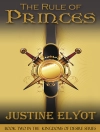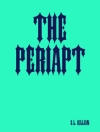If the Gods were real, could you believe?
Hitra, high priestess of Revestre, already has enough on her hands: political upheaval, a distractingly attractive male servant, and an upcoming harvest festival. But when a column of flame from the heavens sends a city into tumult, it upends more than just her schedule. Now, Hitra must deal with a religious schism, ethnic strife…and a God growing out of control.
‘Must read if you like SF with empowered women characters and some good banter along with your questioning of societal mores and standards’
~Mary Grimm
‘An innovative slant on a fantastic religion, its worshippers and divinities!’
~Mary A. Turzillo, Cosmic Cats and Bonsai
‘Even in a conflict on the scale of Gods, Vibbert masters the art of making small things matter.’
~Lorelei Esther, illustrator, The Kitra Saga
‘Creative, quirky, fun, Vibbert delivers a wild new take on divine gods and their petty squabbles in The Gods Awoke!’
~Tobias S. Buckell, Crystal Rain
Содержание
Chapter One: Epiphany
Chapter Two: Congregations
Chapter Three: Families
Chapter Four: Visitation
Chapter Five: Tests
Chapter Six: Annunciation
Chapter Seven: Rites
Chapter Eight: Petitions
Chapter Nine: Canticle
Chapter Ten: Venal Sins
Chapter Eleven: Penance
Chapter Twelve: Mortal Sins
Chapter Thirteen: Confessions
Chapter Fourteen: Passion Play
Chapter Fifteen: Scriptures
Chapter Sixteen: Martyrs
Об авторе
Marie Vibbert has sold over 80 short stories to places like Nature, Analog, and F&SF. Her work has been translated into Vietnamese and Chinese, and has been called ‘…the embodiment of what science fiction should be…’ by The Oxford Culture Review. Her debut novel, Galactic Hellcats, was longlisted by the British Science Fiction Association for 2021. By day she is a computer programmer in Cleveland, Ohio.Marie is also a member of the Science Fiction Poetry Association, SFPA. She was nominated for their Rhysling Award in 2015, 2021, and 2022, won second place in the Hessler Street Fair poetry contest, and once sold a rhyming poem to a magazine that had ‘no rhyming poetry’ in their guidelines.












